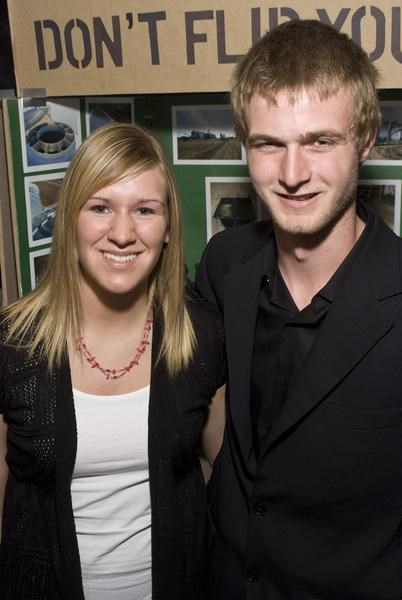It's a well accepted fact that farmers make good inventors, mainly because there are so many unique problems to solve that require individual ingenuity and usually there isn't a lot of infrastructure around to help.
That means that if the problem is going to get solved, farmers are going to have to do it themselves. That apparently goes for young producers too as evidenced by the prize recently picked up by two Midale Central School seniors, Erick Vandenhurk and Jarika Penny.
The two, who come from farming backgrounds, captured the Ernest C. Manning Innovation Achievement Award for their engineered grain bin lid at the Canada-wide Science Fair.
"Farmers will love it," said the judges. "A grain bin lid that says shut when it's supposed to."
The two Midale students were among the nearly 500 finalists at the national fair held at Trent University in Peterborough, Ontario May 15 to 23. They had captured first place at a regional science fair to earn the trip to the Canadian final.
"We got second place in the senior engineering and a High School Family Award," said Erick when speaking with The Mercury last week.
"Canada needs innovation to compete and prosper, and that means we need to encourage and celebrate our innovative youth, " said Bruce Fenwick, executive director of the Ernest C. Manning Awards Foundation which awards $20,000 each year to recognize innovative youth competing at the national science fair. Vandenhurk and Penny picked up $500 of those awards.
The idea for the new bin lid came to Vandenhurk when he and his father Dan were mulling over problems they were having with the family's grain bins whose lids were failing to close properly, leading to water seepage and bird invasions.
This led to a simple, yet unique design for a sliding bin lid that solves the problem by allowing water to slide off instead of pooling while closing firmly through a design that eliminates the problems encountered with spring and tension rod styled lids. The wind can't blow it open either.
Both teenagers enjoy their work on family farms. Vandenhurk participates in 4-H programs and Penny will be pursuing a bachelor of science degree at the University of Saskatchewan next fall with the expectation of eventually becoming a teacher.
The two received a lot of attention including entrance scholarship offers from three universities but Vandenhurk said he'll be going to SIAST next fall in Saskatoon to study agriculture mechanics before returning to the family farm.
"It was a bit of hit and miss at first. We just wanted something to solve the grain lid problem and that led to the design, the first science fair and then Ontario," said Vandenhurk.
"When you face grain bin problems every day, we just thought it would be nice to have a solution," he added.
"Dad thought of the concept; it got drafted on paper. The lid folds in half on a wheel to open and close easily. Jarika was there to do all the paper work and detailing of the drawings. I don't like dealing with that," said Vandenhurk with a laugh.
The design came together within a two-month period. It has since been wind tested. And that doesn't mean any fancy simulated wind tunnels in a university research lab. It's been tested in the very real recent wild winds that have roared through Saskatchewan farmyards for the past two months. The testing for moisture has also been carried out the same way thanks to the near record amounts of rain southern Saskatchewan has received since April. No glitches so far.
"It's steel based with galvanized ball bearing wheels. There's a patent pending on it now," said Vandenhurk, referring to another detail.
He's going to try peddling the new invention at the upcoming Farm Progress Show in Regina to see if there is interest. He figures he'll be able to manufacture and market them at around $500 per lid which compares effectively with the regular lid prices that are usually between $350 and $400. Subsequent models, if the idea takes off, will probably come in at an even more competitive price, but Vandenhurk is banking on the idea that farmers will see the value in finally getting a lid that will keep the grain dry and help keep pests out. He also thinks the more substantial Bin Lid Den as he's calling it, will last a lot longer than the conventional models available on the market today.
"The first two we designed took about $90 in materials and over 10 hours of labour, but then I bent and broke my own steel. So the next generation of lids will be done in a more efficient way, but I'll still do the production," said Vandenhurk.
The lid comes in both 20 and 30 inch diameters to accommodate the traditional bin openings.
Penny confirmed her involvement with the project was definitely on the organizational side, even down to the original science fair registrations.
She and Erick have been long-time friends and have partnered up before for various school projects because they find working with the each other pretty easy. With farming backgrounds, they share common experiences.
The reportage of the details was done on-line, said Penny, and the project reports were done the same way.
"Erick offered to teach me how to weld, but I didn't do that," Penny said with a chuckle.
The patent pending detail was also an information gathering process that she helped, along with her penchant for getting the precise information relayed and conveyed properly. "It should be good to go from this point," Penny said.
"This is the first time we've even looked at anything beyond the regional level for a science fair," said Penny.
Eight projects are chosen each year during the Canada-wide science fair and all receive a Manning Innovation Achievement Award.
"We're just a couple of farm kids who can work together," said Penny, summing up their award winning partnership.



